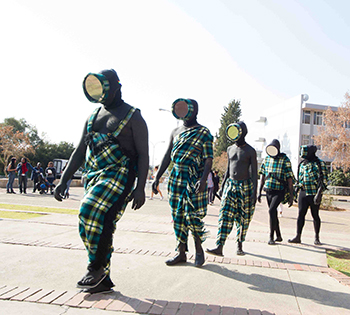Free State Receives R7 Million Grant from the Mellon Foundation for Arts Innovation

Man in the Green Blanket, Lesiba Mabitsela.
Photo: Karla Benade
|
Bloemfontein will experience a flood of new, experimental art over the next four years as a result of R7 million that has been received to develop experimental art projects in central South Africa. The Andrew W. Mellon Foundation recently awarded the grant to the University of the Free State (UFS) for the Programme for Innovation in Artform Development (PIAD). Initiated jointly by the UFS and the Vrystaat Arts Festival in 2014, PIAD was established as a programme to promote the exploration of the arts to advance interdisciplinary research and to impact on human development.
The Andrew W. Mellon Foundation is a New York-based, non-profit organisation which endeavours to strengthen, promote, and, where necessary, defend the contributions of the humanities and the arts to human flourishing, and to the well-being of diverse and democratic societies.
“The Innovation in Artform Development initiative will provide an important contribution to the ways in which the university hopes to broaden and deepen research and dialogue about the humanities in South African society. Using the arts as a vehicle to engage communities around issues of social significance, makes for an exciting endeavour, and we are happy to have Mellon’s financial and partnership investment in this initiative,” said Prof Jonathan Jansen, Vice-Chancellor of the UFS.
“This substantial support from the Foundation will play a pivotal role in facilitating collaborations with national and international artists to explore new, innovative modes of artistic practice and creative production in South Africa,” said Angela de Jesus, UFS Art Curator and Co-Director of PIAD.
“A series of First Nations projects, arts/science research and artist residencies, arts laboratories for creative practitioners, the production of exciting new work for Bloemfontein, and critical debates/forums is expected over the next few years,” she added.
PIAD focuses on supporting cross-cultural, experimental art programmes that can assist South African society creatively. For this process, PIAD is engaging the skills and expertise of South Africa artists in collaboration with several international partners, who are recognised as global leaders in this field, to develop a mutually- beneficial programme of engagement.
Innovation, technology, and new forms of art will be explored and international collaborations that have the potential to attract benefits for the creative industries in Bloemfontein and beyond will be introduced.
“The artistic landscape of the Free State - in fact the whole South Africa - will be forever changed because of this extraordinarily generous grant. Rarely does a regional community get a chance to lead innovation on a national scale, and also impact on experimental art internationally. We are in for an incredible artistic journey,” said Dr Ricardo Peach, Director of the Vrystaat Arts Festival and Co-Director of PIAD.